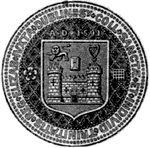Transcriber's Note:
Every effort has been made to replicate this text as faithfully aspossible; some minor changes have been made to correct typographicalerrors, and some inconsistent spelling.
UNIVERSITY EDUCATION
IN
IRELAND.
BY THE
FELLOW OF TRINITY COLLEGE, DUBLIN.

LONDON: WILLIAMS & NORGATE.
DUBLIN: McGLASHAN & GILL.
1868.
Price One Shilling.
Printed at the University Press,
BY M. H. GILL.
Contents
(added by transcriber)
| INTRODUCTION. | 3 | |
| I. | SECULARIZATION OF TRINITY COLLEGE. | 5 |
| II. | NATIONAL UNIVERSITY OF IRELAND. | 10 |
| III. | ROMAN CATHOLIC UNIVERSITY OF IRELAND. | 17 |
UNIVERSITY EDUCATION IN IRELAND.
INTRODUCTION.
The political condition of Ireland is, at present, grave;and, in the event of a war with the United States, wouldbecome menacing, to England.
Irish politicians assert—and it is partly admitted bytheir opponents—that, in the existing state of Ireland,three questions demand an immediate solution: thesequestions are, the Land Question, the Church Question,and the Education Question.
The tenant farmers of Ireland wish for fixity oftenure, and care but little for compensation for improvements,except as a means of obtaining a practical fixityof tenure; and they would, unquestionably, rejoice tosee transferred to themselves, as occupiers of the soil,the rights now enjoyed by absentee noblemen and landlords.It is the opinion of many that the Land questioncannot be settled without such a change of owners aswould practically amount to a revolution.
With respect to the question of the Church, the moreintelligent laymen of the Irish National party openlyavow their wish to alienate the property of the Church,on the ground that its existence forms a barrier to theunion of Irish Protestants with the Catholic majority inthe formation of a truly National Irish party. It isasserted, and apparently not without reason, that if theIrish Protestants felt themselves cast off by England,[4]and their Church endowments confiscated, they mightbecome more willing to join their countrymen in an anti-Englishpolicy, which the rude breath of war mightsome day fan into a demand for an Irish Republic,under the guarantee of France and America. It is forEnglish politicians to decide how far the advantage